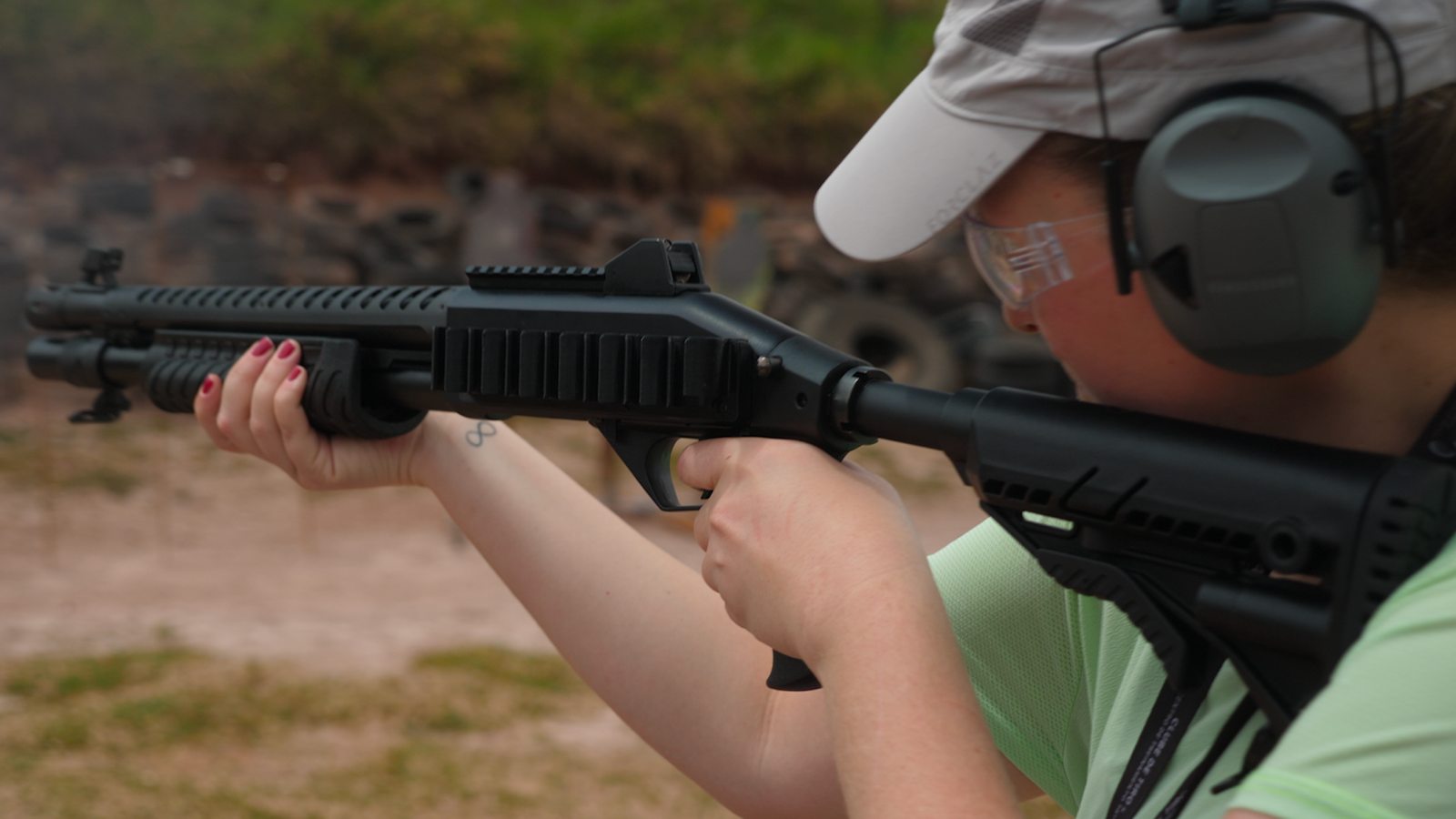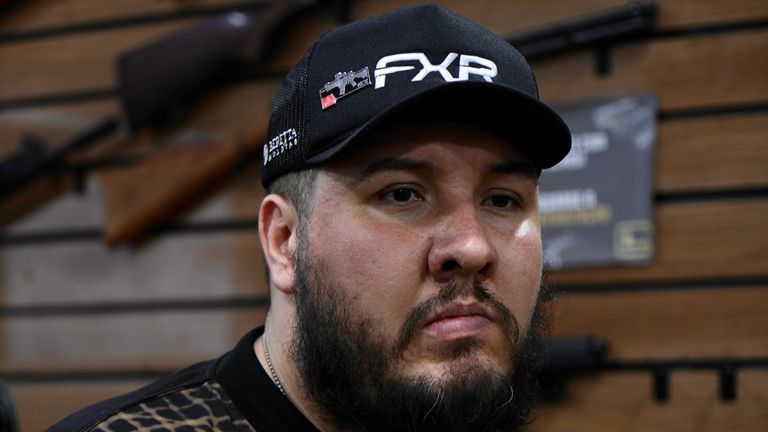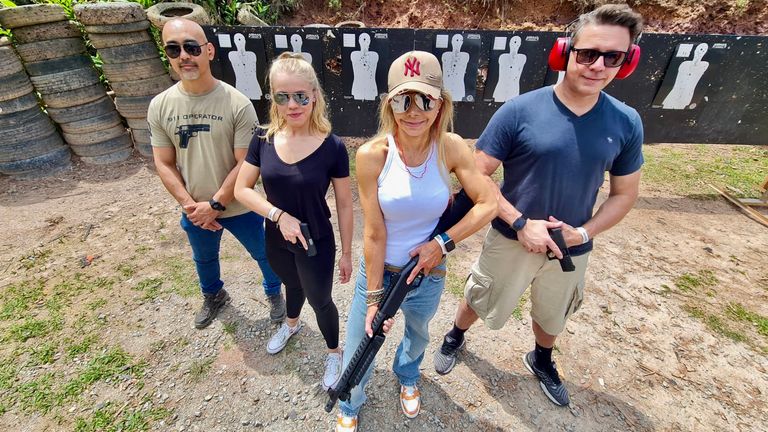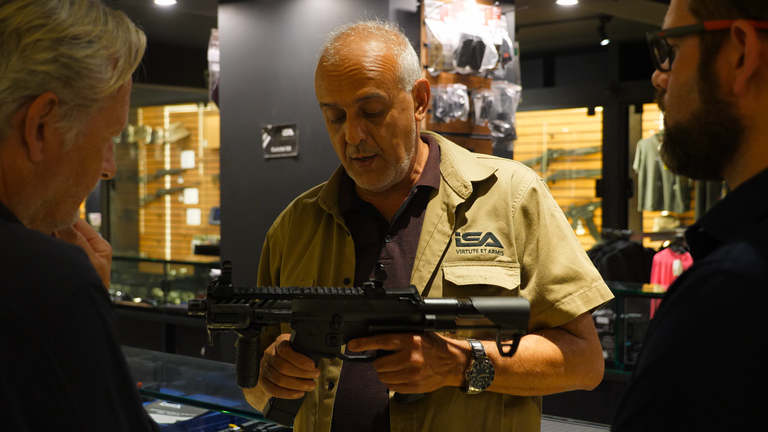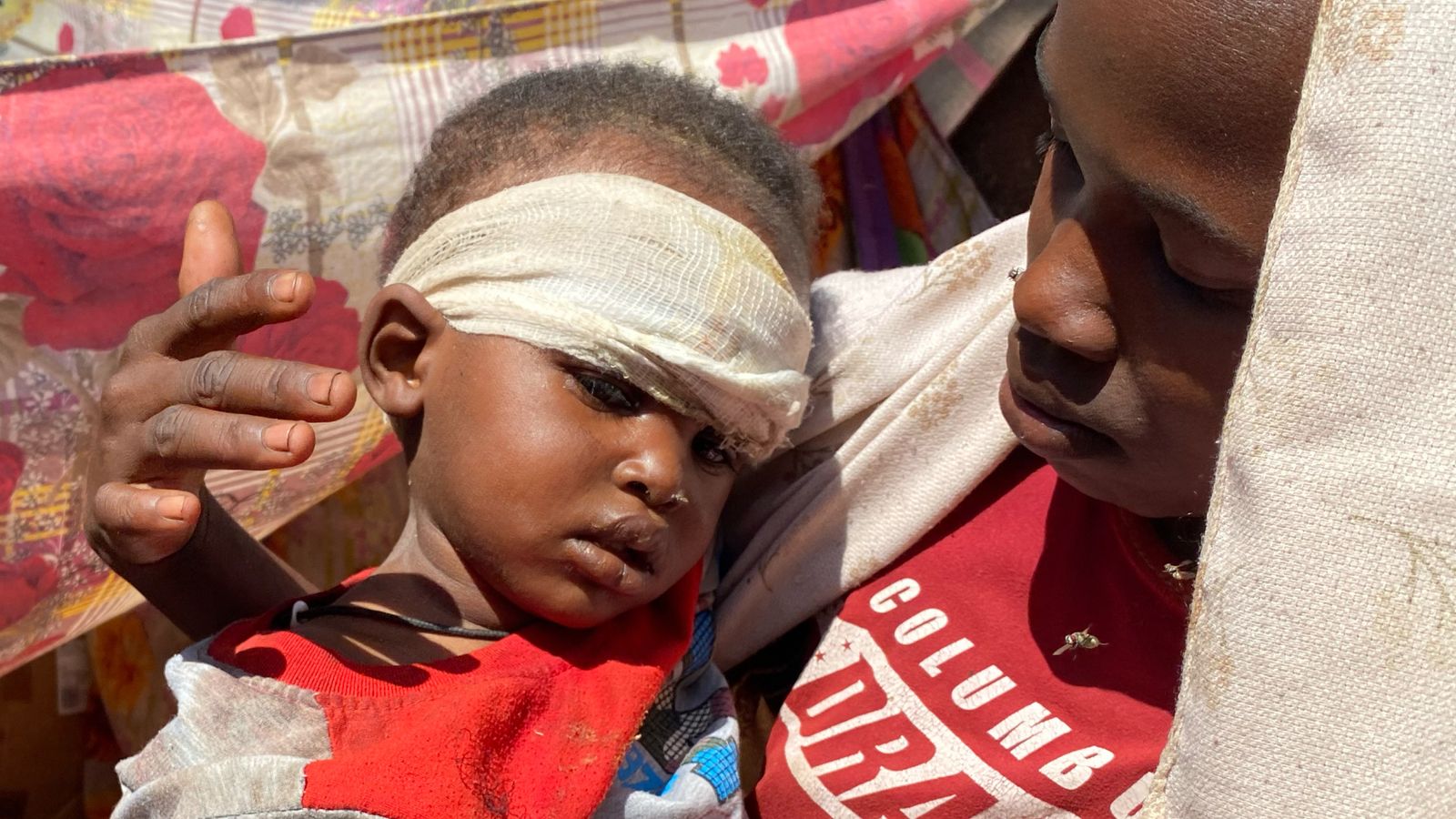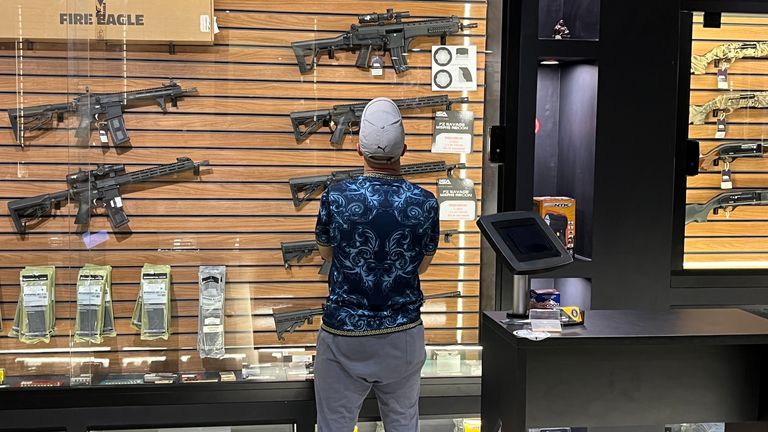
It is a quiet street in a fairly tough part of Sao Paulo, but the sound of high velocity weapons firing and the thud of rounds impacting every few seconds is somewhat disconcerting.
We ring the doorbell of an innocuous-looking building; after a few minutes the thick metal door opens, and we are greeted by a man wearing a smart black jacket over body armour.
He motions us inside and the door shuts. In front of us, another metal door slides open and the sound of shooting greets us through a cloud of barbecue-smelling smoke.
This is the G-16 gun club and it’s open 24 hours a day. It’s lunchtime and the BBQ, included in the membership fee, is on outside.
In the Brazil of President Jair Bolsonaro, gun clubs have been opening at the astonishing rate of one a day for the past four years.
The atmosphere is friendly but businesslike. At desks people fill out their forms for gun licences. Milling about, with pistols in holsters and dressed in military gear, the members and trainers prepare for the firing ranges dotted about the building.
Machine guns line the walls and handguns sit on display cabinets.
A young woman explains that people with licences can buy and take away the handguns, but they have to order the assault rifles.
“Or you can borrow them while you’re here and use them on the range,” she adds with a beaming smile.
Private gun ownership has rocketed under the right-wing government of Mr Bolsonaro.
He and his supporters contest that bearing arms is a fundamental right, although, unlike the United States, this isn’t actually mentioned in Brazil’s constitution.
‘Bolsonaro is a gun enthusiast’
The burly owner of the G-16 club, Gustavo Pazzini, is proud of how much his business has grown in the past few years. He started with one club, and he now has four with 12,000 members.
He is an unabashed Bolsonaro supporter – the president’s picture hangs in the club’s foyer.
“Bolsonaro is a gun enthusiast, a military man, a pro-freedom politician, and he managed to make some changes, and this has generally heated up the market, and it has rekindled the dreams of Brazilians who are gun enthusiasts and like guns.”
It’s a big booming growth sector and is another key issue in this desperately tight election battle.
Brazilians will head to the polls next Sunday for a second round vote after both Mr Bolsonaro and his rival Lula da Silva failed to secure enough votes for an outright win.
The highly polarised vote will determine whether the country returns a leftist to the helm of the world’s fourth-biggest democracy or keeps the far-right leader in office for another four years.
In what is arguably the country’s most critical election since the end of the military dictatorship in 1985, Mr da Silva of the leftist Workers’ Party won 48.26% of votes and Mr Bolsonaro secured 43.34%.
Threat of election-linked violence
An hour or so outside Sao Paulo, we pulled off the main road and drove towards a series of port-a-cabins on the edge of a big open space.
Even in our car the sound of machine gun fire, pump action shotguns and revolvers was really loud.
This is the Assault shooting range, a sort-of country club for amateur gun users and a training ground for police and more serious gun club enthusiasts dressed in matching uniforms, keen to learn battlefield craft like the military.
There is fear that Bolsonaro-supporting groups will fashion themselves on America’s Trump-supporting gun carriers.
That fear has been highlighted by the closeness of the election and the threat of election-linked violence.
But a day out at the Assault shooting range is also something of a family affair.
‘I think it’s cool’
All the generations of the Stopa family are on the range with a variety of weapons and an instructor showing them how to use them all.
Eighteen-year-old Georgia is firing a weapon for the first time today.
“I think it’s so cool, I’m very happy,” she told us excitedly after firing the shotgun.
Her proud mum took pictures the whole time.
Their instructor is deadly serious but there are laughs and smiles throughout the lesson.
The Assault club’s owner, a former police officer, has no doubts that anything but a Bolsonaro win will be bad for him and his business.
President Bolsonaro has used executive powers to relax the country’s previously stringent gun laws imposed by his electoral adversary Mr da Silva.
“People worry about Lula’s return to government, of course, if his first attitude is to disarm the population. The more insecure, the more disarmed and the more illiterate the population is, the better it is for them,” the club owner explained to me.
On our way back from Assault, we stopped off at one of the country’s biggest gun shops.
ISA comes complete with an upscale café restaurant and is pristine inside, with mood lighting and glass cabinets full of gleaming weapons of every description.
This is a very successful business, and it has blossomed under Mr Bolsonaro.
The gun shop’s owner told us he clears £1.7m every month.
Clovis Aguiar showed Jorge Seif, a Bolsonaro-supporting senator who is a big player in politics here, weapons he has imported from his factory in Israel.
I asked the senator if he would like one of the weapons – yes, he enthusiastically replied, laughing.
Mr Seif is confident that Mr Bolsonaro will win, and says if he does, and they control the senate, they will change the gun laws permanently.
“When a socialist government, a dictator government, an oppressive government comes to power, their first action is to disarm the population,” he said, referring to Lula da Silva’s Worker’s Party.
“But President Bolsonaro shows his commitment to the Brazilian people, right? Above all he respects democracy because he trusts his population when he gives them the right to buy firearms.”
Read more:
Brazil election: Marginalised people hold balance of power
Amazon rainforest under attack – and election could seal fate
Mr da Silva and his supporters say that having more guns in a country that already has a terrible record for crime is at best reckless.
Mr Bolsonaro’s followers disagree, arguing guns allow people to protect themselves.
Like so many things in this election, they will never agree.

